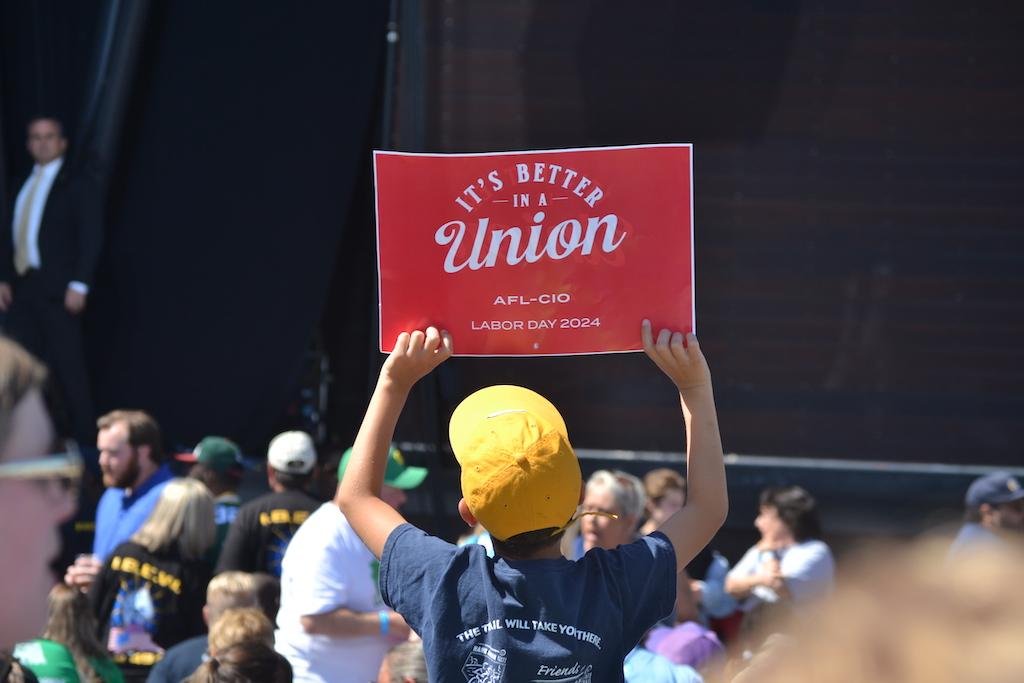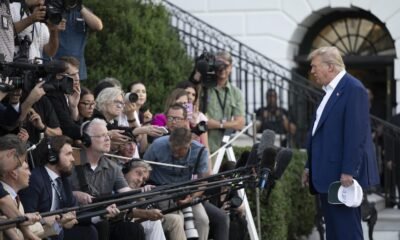Business
In Key Swing States, Unions Rally to Thwart Trump’s Comeback

As the presidential election approaches, union dynamics are shifting in critical battleground states. Efrain Campos, a retired Wisconsin carpenter, recently attended Laborfest in Milwaukee, joining hundreds of union members. Reflecting on his voting intentions, Campos expressed disappointment over the Democratic Party’s shift to Vice President Kamala Harris as its candidate, yet he remains supportive of advancing middle-class interests.
Democrats are banking on unions to secure votes in key swing states like Wisconsin, Michigan, and Pennsylvania. Despite a decline in union membership strength, these labor groups still wield significant influence. Leaders within the AFL-CIO, a federation representing various unions, emphasized their commitment to electing Harris while maintaining that many rank-and-file members align with Trump.
Paul Clark, a labor relations professor at Penn State, observed a split in union support, with a notable percentage of union members leaning towards Republican candidates. Amid this sentiment, International Brotherhood of Teamsters President Sean O’Brien revealed the union would refrain from endorsing either presidential ticket due to substantial member support for Trump, marking a divergence from party leadership.
Conversely, organizers like Nick Webber from the North American Building Trades Unions highlighted a surge in interest from union members eager to engage politically and support the Democratic ticket. The AFL-CIO’s rapid endorsement of Harris demonstrated a unified front aimed at showcasing the administration’s pro-worker policies over the past few years.
Trump’s attempts to court union voters have included promises to block foreign acquisitions of U.S. companies. Despite such gestures, unions have maintained their backing for Biden and Harris, focusing on policies they argue favor working people, including recent bipartisan infrastructure investments. Union leaders are keenly aware of the contrasting records of Trump and the Biden administration, particularly regarding labor policies and economic support initiatives.
Although Trump successfully drew working-class support in 2016, his messaging faces challenges this election cycle. Recent polls echoed within the Teamsters indicated a significant fraction of members supporting Trump, yet local union leaders voiced their backing for Harris, emphasizing her commitment to labor rights.
In Nevada, Culinary Workers Union’s endorsement of Harris was reinforced by her commitment to policies favoring tipped workers, further solidifying union support among hospitality employees. Union leaders across states continue robust outreach to communicate the stakes of the election to their members.
Members are actively engaging in discussions about the implications of voting for their livelihoods. Educational initiatives are being introduced within unions to ensure members understand how national policies impact workers directly. Experienced union members are taking it upon themselves to foster deeper connections and dialogue with newer members, pushing back against narratives that could lead members to overlook their best interests.
The upcoming election could pivot on how effectively unions can translate their support into votes. Leaders like Paula Uhing from the Steelworkers union recognize the need for continued engagement, noting that many union members may not yet fully appreciate the current political landscape. As election day nears, union outreach efforts intensify, underscoring the critical role labor organizations will play in shaping the outcome.
As the political landscape evolves, the contrasting visions offered by the candidates underscore the stakes for union workers. How unions mobilize their members in the coming weeks could determine the level of impact they have in the election.


















